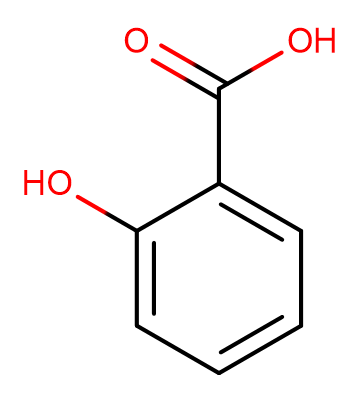
Salicylic acid
CAS No. 69-72-7
Salicylic acid( Salicylic acid | NSC 180 | NSC180 | NSC-180 )
Catalog No. M15674 CAS No. 69-72-7
Salicylic acid is a natural product extract from Willow bark, well known as an antiinflammatory inhibitor of cyclooxygenase activity.
Purity : >98% (HPLC)
 COA
COA
 Datasheet
Datasheet
 HNMR
HNMR
 HPLC
HPLC
 MSDS
MSDS
 Handing Instructions
Handing Instructions
| Size | Price / USD | Stock | Quantity |
| 500MG | 30 | In Stock |


|
| 1G | Get Quote | In Stock |


|
Biological Information
-
Product NameSalicylic acid
-
NoteResearch use only, not for human use.
-
Brief DescriptionSalicylic acid is a natural product extract from Willow bark, well known as an antiinflammatory inhibitor of cyclooxygenase activity.
-
DescriptionSalicylic acid is a natural product extract from Willow bark, well known as an antiinflammatory inhibitor of cyclooxygenase activity.(In Vitro):Salicylic acid is an effective inhibitor of COX-2 activity at concentrations far below those required to inhibit NF-κB (20 mg/mL) activation. Salicylic acid inhibits prostaglandin E2 release when add together with interleukin 1β for 24 hr with an IC50 value of 5 μg/mL, an effect that is independent of NF-κB activation or COX-2 transcription or translation. Salicylic acid acutely (30 min) also causes a concentration-dependent inhibition of COX-2 activity measured in the presence of 0, 1, or 10 μM exogenous arachidonic acid. In contrast, when exogenous arachidonic acid is increased to 30 μM, Salicylic acid is a very weak inhibitor of COX-2 activity with an IC50 of >100 μg/mL. When added together with IL-1β for 24 hr, Salicylic acid causes a concentration-dependent inhibition of PGE2 release with an apparent IC50 value of approximately 5 μg/mL. The ability of Salicylic acid to directly inhibit COX-2 activity in A549 cells is tested after a 30-min exposure period, followed by the addition of different concentrations of exogenous arachidonic acid (1, 10, and 30 μM). Salicylic acid causes a concentration-dependent inhibition of COX-2 activity in the absence of added arachidonic acid or in the presence of 1 or 10 μM exogenous substrate with an apparent IC50 value of approximately 5 μg/mL. However, when the same experiments are performed using 30 μM arachidonic acid, Salicylic acid is an ineffective inhibitor of COX-2 activity, with an apparent IC50 value of more than 100 μg/mL, and achieves a maximal inhibition of less than 50%.(In Vivo):In C57Bl/6 DIO mice, Salicylic acid decreases both fasting and postprandial plasma glucose levels. Furthermore, there is a trend to reduce plasma triglyceride levels after Salicylic acid treatment in C57Bl/6 DIO mice (P=0.059). Salicylic acid significantly reduces 11β-HSD1 mRNA in omental adipose tissue in C57Bl/6 DIO mice, with a similar trend in mesenteric adipose (P=0.057). In mesenteric adipose of C57Bl/6 DIO mice, Salicylic acid also reduces 11β-HSD1 enzyme activity.
-
In Vitro——
-
In Vivo——
-
SynonymsSalicylic acid | NSC 180 | NSC180 | NSC-180
-
PathwayChromatin/Epigenetic
-
TargetCOX
-
RecptorCOX
-
Research AreaInflammation/Immunology
-
Indication——
Chemical Information
-
CAS Number69-72-7
-
Formula Weight138.12
-
Molecular FormulaC7H6O3
-
Purity>98% (HPLC)
-
Solubilitysoluble in Water
-
SMILESO=C(O)C1=CC=CC=C1O
-
Chemical NameBenzoic acid, 2-hydroxy-
Shipping & Storage Information
-
Storage(-20℃)
-
ShippingWith Ice Pack
-
Stability≥ 2 years
Reference
1.Moon C, et al. Neurosci Lett. 2004 Feb 12; 356(2):123-6.
molnova catalog



related products
-
Firocoxib
Firocoxib is a selective non-steroidal inhibitor of cycooxygenase-2 (COX-2) (IC50 of 0.13 μM), with anti-inflammatory for use in dogs and horses.
-
(R)-Naproxen
An anti-inflammatory agent with analgesic and antipyretic properties.
-
Famprofazone
Famprofazone (Gewodin, Gewolen) is a non-steroidal anti-inflammatory agent (NSAID) of the pyrazolone series .



 Cart
Cart
 sales@molnova.com
sales@molnova.com


